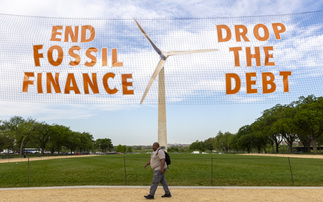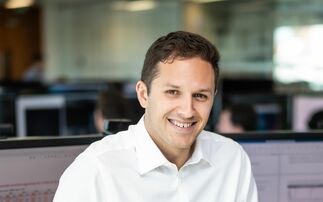Schroders' head of European Blend Equities Nicholette MacDonald-Brown and fund manager Scott MacLennan explain the three elements at the core of their sustainable investing approach
Sustainable funds have been growing rapidly in recent years amid increased environmental awareness and as the current pandemic puts social issues front of mind. However, there's no standard industry definition of sustainable investing.
The term 'sustainability' is often over-used in investment speak and has become a catch-all term for a number of different approaches. Our colleagues in the Schroders Sustainable Investment team have developed a primer to help decipher the jargon: Everything you need to know about sustainable investing.
In terms of our approach, there are three elements that we see as crucial:
- Purpose - what we think sustainable investing can achieve in terms of investment returns and influencing company behaviour;
- People - assessing sustainability is often a judgement call and can't be boiled down to scores or ratings provided by a third party;
- Process - bringing purpose and people together to create a repeatable process that evolves and improves over time.
Investing with a purpose
For us, the purpose of sustainable investing is to have a positive impact on society and corporate behaviour, while at the same time helping clients to achieve their investment goals. It means choosing to allocate our capital to companies that are either already being run in a sustainable fashion, are in transition, or are on their way to improving their sustainability profile.
There is a common misconception that investors need to compromise their risk and return aspirations in order to achieve a positive impact. We firmly believe this is not the case; sustainability is an integral element rather than a trade-off.
Sustainable investing sets minimum standards of behaviour for an investee company. If a company is engaging in activities or behaviour that are causing serious harm to society then there is no valuation, however attractive, that can compensate for that negative impact. But we don't think drawing a line in the sand like this is detrimental to investment returns.
Why do we think this? Ultimately, it's because what we're looking for are sustainable business models. As investors in European equities, we're looking to invest for the long term and seeking to gauge a company's future prospects. Can they grow their business? Can they improve their profit margins? Are they at risk of regulatory fines, or of falling behind their competitors?
For example, if a company is not adequately considering its impact on the environment then it risks being fined by regulators and suffering reputational damage among its customers. If it is underpaying its employees then it may have problems with staff retention, and profit margins could be lower in future if wages need to rise. By contrast, companies who consider their impact on stakeholders - such as employees or the environment - are better placed to avoid such risks.
It's important to add that we're not simply investing in the most sustainable companies today, regardless of their share price prospects. We're looking for mispriced opportunities, where the current share price doesn't capture the company's potential. Identifying sustainability risks, and potential for improvement, is a crucial element of trying to achieve higher investment returns.
People-powered analysis
Assessing sustainability risks and opportunities often comes down to judgement. This is where the support of our team of European equity analysts is invaluable.
We've already said that sustainable investing means having a positive impact on society and corporate behaviour. When considering a company's impact, we can split that into three categories:
- what a company does, in terms of the products or services it provides;
- what costs or benefits the company imposes on society (which may not be immediately obvious). At Schroders we have our SustainEx investment tool which helps us assess this;
- how the company behaves towards its employees, suppliers and other stakeholders. We have another investment tool - CONTEXT - which allows us to assess this and compare the company to its peers.
Importantly, we make these assessments hand-in-hand with our usual financial analysis. What we find is that asking questions around sustainability issues helps us to gain a deeper understanding of a business. Rather than dealing solely with a company's executive management team, engaging on sustainability issues across the company can often give a clearer picture of the operational side of a business.
This is particularly important to us as investors in European equities. Europe as a region is more advanced than most when it comes to sustainability reporting. But that makes it all the more crucial for us to check whether a company treats sustainability as a box-ticking exercise, or whether it really is embedded in the business.
Instead of relying on blunt tools such as scores provided by third parties like Sustainalytics, the conversations we and the analysts have with businesses enable us to build a nuanced, forward-looking picture. As sustainability grows in importance, these conversations are increasingly a partnership whereby both we and the businesses we engage with are looking at ways to improve. The questions we ask can help drive progress.
For example, it may be that a company has developed sustainable practices, but needs help on the best way to show evidence of this. Other companies - especially smaller firms - may need guidance on what is best practice.
We sometimes encounter situations where a company is not following best practice on a sustainability issue. But rather than being an automatic red light, our analysts can engage with the company to discover if there is a valid reason. This ability to discuss the grey areas in sustainability is essential, in our view, and it is missed if you just rely on third party ratings. We also often find that a conversation about sustainability issues with one business can aid our understanding of similar issues facing a different firm.
A repeatable process
We combine our purpose, tools and insights into a process for assessing sustainability that is forward-looking, repeatable, and valid across different sectors.
It's also a process that works whether we are looking at lowly-valued stocks or 'quality growth' areas of the market. Quality growth companies tend to have consistent returns and this is often seen as a mark of sustainability. But cheaply-valued companies can also be sustainable investments.
We would highlight banks as a lowly-valued sector that has to grapple with many thorny sustainability questions. These include who they lend to and what activities they may be financing, as well as customer security given the rise of online banking. There are few easy answers but banks are aware of the risks in terms of fines and reputational damage when things go wrong. Their thinking around sustainability is therefore more advanced than their share prices might suggest.
Crucially, our process is one that can evolve as sustainability issues grow in importance to clients and to wider society. For example, the pandemic has brought home the importance of resilient supply chains and treatment of employees. We believe sustainability standards will rise over time; what's best practice today may be tomorrow's bare minimum. Our process has the ability to evolve and improve, enabling us to remain focused on the future and the best mispriced opportunities we can find.
Nicholette MacDonald-Brown head of European blend at Schroders, where Scott MacLennan is fund manager.








